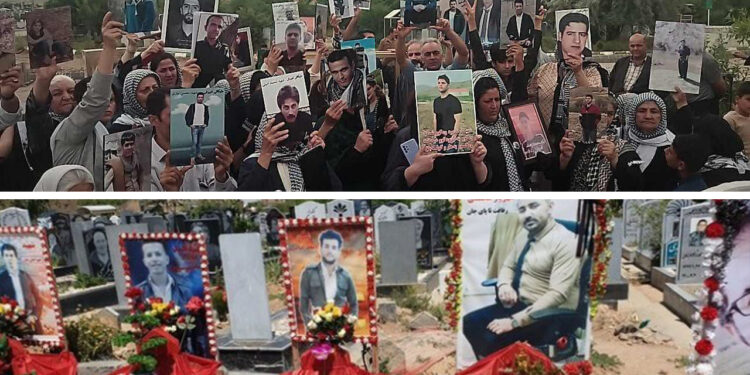People in several cities of the Kurdish-majority regions in Iran’s west, known as Rojhilat, defiantly commemorated the Jin Jiyan Azadî (Woman Life Freedom) uprising victims under heavy presence of security forces on the first day of Eid al-Adha.

Victims of attacks by Iran’s Islamic Revolutionary Guard Corps (IRGC) during the Jin Jiyan Azadî (Woman Life Freedom) uprisings were commemorated on Wednesday, on the first day of Eid al-Adha in several cities of Kurdish-majority regions in Iran’s west, known as Rojhilat.
The graveside commemorations took place under the presence of security forces and amid threats issued to the victims’ families, with crowds echoing Jin Jiyan Azadî slogans and singing revolutionary songs.
Citizens also paid visits to the families of the victims at their homes earlier in the day, expressing solidarity and support.
According to the Kurdistan Human Rights Network (KHRN), the Iranian authorities have been resorting to threats against the families of the victims to dissuade them from organising the commemorations. Families have allegedly received intimidating phone calls, warning them against holding any events in remembrance of their loved ones.
The crackdown by Iranian authorities on those seeking to commemorate their loved ones on Eid al-Adha represents an extension of the harsh measures taken against peaceful protests organised by relatives of the deceased at cemeteries in recent months, which have faced heavy handed responses from security forces, particularly in the Kurdistan province.
In recent months, Aichi cemetery, where many Kurdish protesters, including Jîna Mahsa Amini, whose death sparked the protests, were buried, has been turned into a construction site by the government, grave sites have been altered, and some protesters’ graves have even been moved.
While Amini’s tomb remains located in the cemetery, Aichi cemetery modifications have made her memorial stone inaccessible to the public.








Leave A Comment